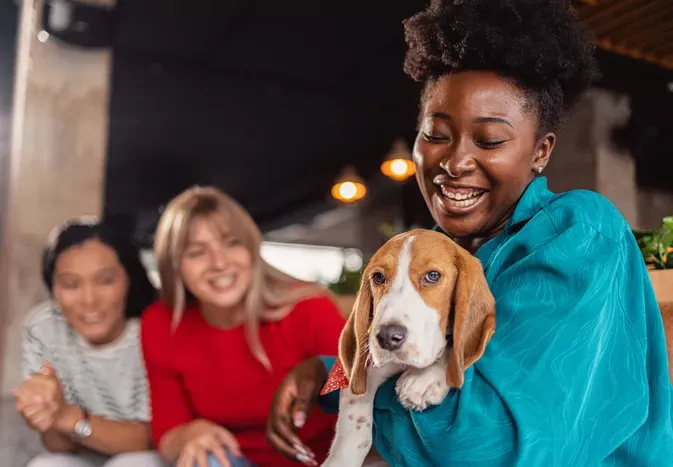How to Socialize Your Dog or Puppy
Updated on 05/27/24

Unlocking the Social Graces: A Comprehensive Guide to Socializing Your Dog or Puppy
In the captivating tapestry of pet ownership, socialization reigns supreme as an essential thread. A well-socialized canine companion not only enriches our lives but also fosters harmony within our communities. Let us embark on a journey of exploration, unraveling the intricacies of dog socialization and empowering you with the knowledge to cultivate a confident and well-rounded furry friend.
The Importance of Socialization
As social creatures, dogs thrive on interactions with their canine peers and humans alike. Socialization provides a myriad of benefits, including:
- Reduced Stress and Fear: By exposing your dog to various environments and social situations, you help them develop coping mechanisms for future interactions, reducing anxiety and fearfulness.
- Improved Communication Skills: Socialization allows dogs to learn the appropriate social cues and body language necessary for effective communication, preventing misunderstandings and conflicts.
- Stronger Social Bonds: Through positive socialization experiences, dogs develop strong relationships with their owners, other dogs, and family members, fostering a sense of belonging and security.
The Critical Window of Socialization
During puppyhood, between 8 and 16 weeks of age, puppies exhibit an increased receptivity to new experiences, making it the optimal time for socialization. This critical window provides a window of opportunity to lay the foundation for a well-adjusted and social dog.
How to Socialize Your Dog or Puppy
Socialization is a gradual and ongoing process, involving a variety of positive experiences. Here are some effective techniques:
- Puppy Play Dates: Arrange playdates with age- and size-appropriate puppies in a safe and controlled environment.
- Dog Park Visits: Supervised visits to dog parks offer opportunities for controlled socialization with other dogs.
- Group Training Classes: Enrolling your dog or puppy in group training classes provides socialization opportunities while reinforcing basic obedience skills.
- Walks and Outings: Take your dog on regular walks in public places, such as parks or sidewalks, to expose them to different sights, sounds, and smells.
- Meet-and-Greets: Invite friends and family members who have well-behaved dogs to visit and interact with your puppy.
Examples of Successful Socialization
* Luna, a playful golden retriever puppy, enjoyed weekly playdates with her littermates and other puppies from her neighborhood. She developed strong social bonds and learned how to interact appropriately with other dogs, reducing her fearfulness in future social situations.
* Buddy, a shy and timid beagle, attended group training classes, where he gradually gained confidence through positive interactions with other dogs and the instructor. He now thrives in social environments and enjoys playtime with his canine friends.
Tips for Effective Socialization
- Go Slow and Gradual: Don't overwhelm your puppy with excessive social interactions. Start with short, positive experiences and gradually increase the duration and intensity as they become more comfortable.
- Respect Body Language: Pay attention to your dog's body language and stop interactions if they show signs of discomfort or fear.
- Positive Reinforcement: Reward your dog for appropriate social behavior with treats, praise, or play.
- Supervision: Always supervise your dog or puppy during social interactions to ensure safety and prevent any negative experiences.
Conclusion
Socializing your dog or puppy is an investment in their long-term well-being and happiness. By incorporating these strategies into your training routine, you can cultivate a confident, well-rounded companion who will bring immeasurable joy and enrichment to your life. Remember, a socialized dog is a happy dog, and a happy dog is a joy to behold.
Explore More Pets

Basic Training
Puppy and Baby Introductions

Working Dog Breeds
All About Search and Rescue Dogs

Dog Treatments
Puppy Vaginitis: Signs, Causes and Treatment

Dog Adoption
After More Than 1,200 Days in the Shelter, Coco Goes Home

Basic Training
How to Train Your Puppy to Go on Potty Pads

Hybrid Dog Breeds
The Difference Between a Mutt, Mixed Breed, or Designer Dog?

Dog Treatments
Nail Problems in Dogs

Puppies
7 Reasons Why Two Dogs Are Better Than One
